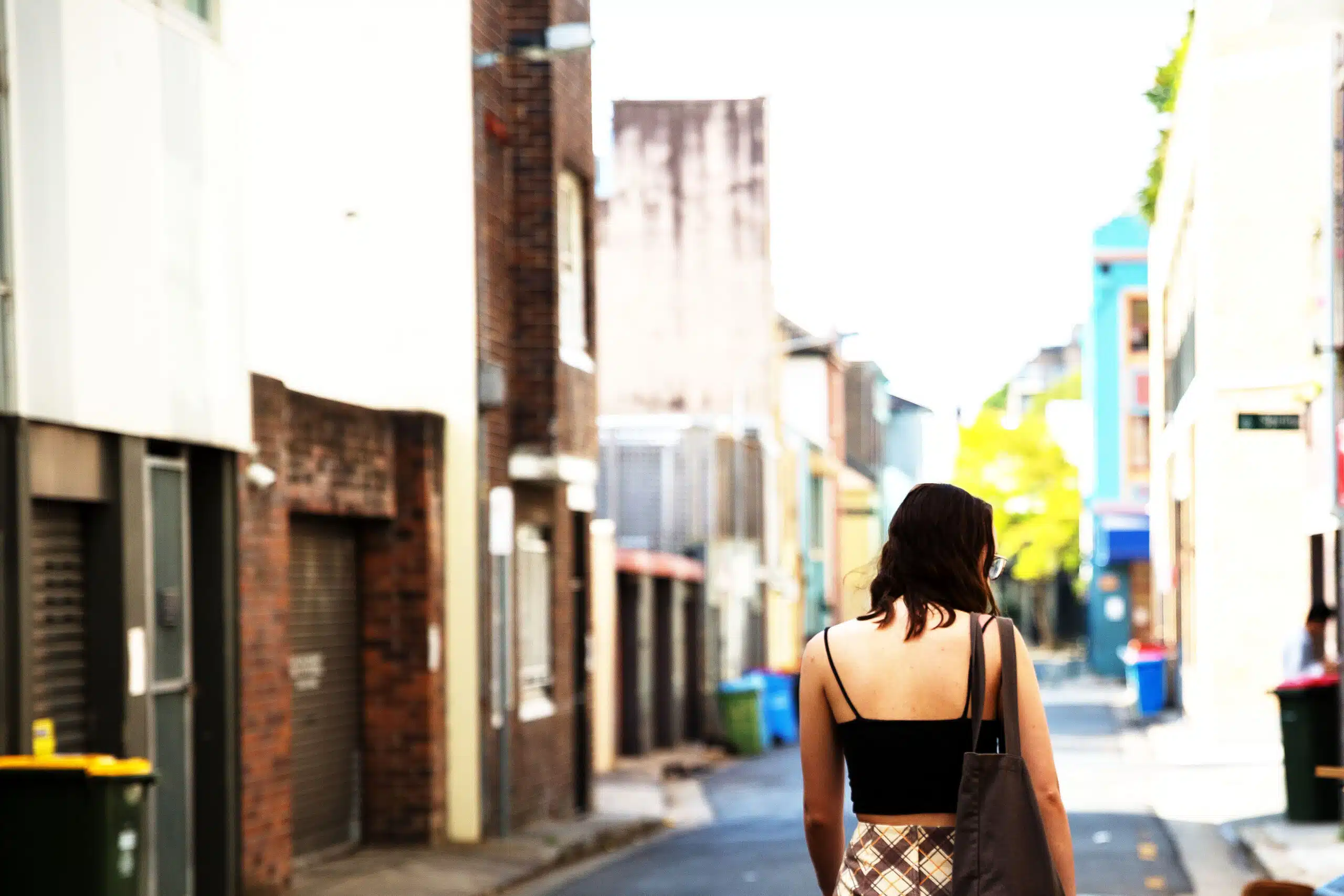Media Centre - 7 April 2022
New research finds COVID-19 has led to one in five Australian young women feeling even more unsafe walking alone in public

As Australians slowly emerge from the pandemic and lockdowns, young women and girls’ perceptions of safety and harassment in public places has plummeted, new data from charity for girls’ equality Plan International Australia has revealed.
With streets, train stations, and parks still significantly emptier than before the pandemic, one in five (19%) Australian women aged 18-24 said they feel less safe being alone at night in these places than before COVID-19. Just 5% of those surveyed said they felt safer. For young women with a disability, more than one in four (27%) said they felt less safe.
The survey – which was conducted through YouGov and sampled almost 500 young women – has been released as more than 30 countries around the world observe International Anti-Street Harassment week this week to raise awareness on a pervasive yet often overlooked issue.
It follows the revealing statistics uncovered the recent YourGround study – a crowd-mapping project led by Monash University XYX Lab and Crowdspot that analysed equity, access and use of public spaces such as parks, exercising and walking trails, train stations and car parks during the periodic COVID-19 lockdowns in Melbourne and Victoria.
The study found that for girls and gender diverse people under age 20, the most significant reason for feeling unsafe was sexual harassment, with this reported by 42% of respondents. Almost one quarter (23%) felt unsafe because of bad stories they’d heard from friends or other people – significantly higher than older age groups.
Young women and gender diverse people that Plan International Australia spoke to said that the pandemic and rolling lockdowns had lead to fewer bystanders on the streets to help or intervene in street harassment which had left them feeling more isolated and heightened their fears and anxiety.
One young woman spoke about the on-going trauma she faces after being assaulted by a man in a public space last month.
Other young women commented on the psychological toll COVID-19 had had on both victims and perpetrators of street harassment.
“Before the pandemic I had experienced street harassment on multiple occasions throughout my life,” said youth advocate Ruvimbo Togara.
“After two years of a global pandemic, lockdowns, bushfires, floods and now war, it’s no surprise that so many people in our society are experiencing issues with their mental health. I think all of this heavy news is weighing on us all, and it certainly has lead to me feeling more nervous when I’m outside. At the same time, I get the sense that all of this has emboldened perpetrators of violence – I feel like the street harassment I now experience is more aggressive, more brazen. It’s really chilling.
“Feeling safe should be a right but it’s very unfortunate that even after years of research and putting things in place to make cities safer for women and gender diverse people, that there’s been an increase in more of us feeling unsafe through the pandemic. Street harassment seems to be an unending cycle and something needs to be done to break this cycle. I’m tired of walking around during the day or night expecting something bad to happen. When will I be able to walk freely and confidently without worry? I am deserving of that and so are other people who embody this experience,” she said.
Plan International Australia CEO Susanne Legena said that she was distressed by the findings but sadly not surprised.
“From leering, flashing, catcalls and sexist slurs to groping, stalking, assault and rape – the reality is that the overwhelming majority of women and gender diverse people will face gender-based street harassment in their lives. We must ensure that all girls and young women are free, safe and equal.
“COVID-19 closed borders, it ground entire industries to a halt and caused restaurants and retailers to shut their doors, but it didn’t stop street harassment. What’s more, the empty streets left the people who are some of the most at risk in our community to street harassment and abuse even more exposed and vulnerable: essential workers such as nurses and childcare workers, many of whom are women and migrants who had to continue commuting to work day in, day out,” she said.
“We know that Australia is one of the more dangerous places in the region when it comes to street harassment – in fact, a new global gender index we shared last month found we are in the bottom 50% in the Asia-Pacific when it comes to women’s perceptions of safety. Just over half of Australian women over 15 feel safe walking alone at night in their home area, and in fact a 10-year-old Australian girl will never in her lifetime see an Australia where women feel safe to walk along at night
“All of these findings prove that as we begin to emerge from the pandemic, the world is still off track when it comes to gender quality and the safety of women and girls. It also confirms that ‘getting back to normal’ is simply not ambitious enough, given that the ‘normal’ that prevailed before COVID-19 was failing to deliver.
A new generation of young feminist trailblazers are training Australians to be impactful bystanders
Plan International’s work with girls around the world has revealed that there are three clear steps to addressing street harassment. Authorities need to encourage girls and young women to report instances of harassment, improve the responses they receive from authorities, while governments need to invest in public awareness and behaviour change campaigns.
The organisation’s groundbreaking street harassment research over the last five years found that street harassment is largely condoned by society with bystanders usually doing just that – standing by. This forces girls to adjust their behaviour to protect themselves.
But an inspiring group of six Plan International Australia youth advocates are taking action, rolling out and leading L’Oreal Paris’ Stand Up Against Street Harassment campaign, which will see the youth leaders deliver training sessions to empower people everywhere to combat sexual harassment in public spaces.
Through their advocacy over the last five years on street harassment, these inspiring young people have already helped make cities like Sydney and Melbourne safer.
Youth leader and trainer Elizabeth Payne believes all and any experience of street harassment is serious and deserves to be called out.
“I’ve had a lot of people come to me with disclosures of street harassment. I’ve experienced street harassment myself that made me fear for my safety. I’ve seen and felt first hand the confusion and anger people feel and the overwhelming sentiment that their experience ‘wasn’t significant enough’ to report.
“As a society we have fallen into the trap of assuming if we can’t prove it, if there is no evidence other than our internal hurt, it’s not worth reporting because what are they going to do about it. We need to start standing up for each other and not brushing this off as a normal experience. We need to be better bystanders. No one deserves to feel unsafe, period,” she said.
[ENDS]
About the polling
YouGov conducted this poll with a politically representative national online sample of 473 female Australian citizens aged 18-24 in both city and regional areas between 22-29 March, 2022. The figures have been weighted and are representative of all Australian female citizens aged 18 -24.
Media contacts


